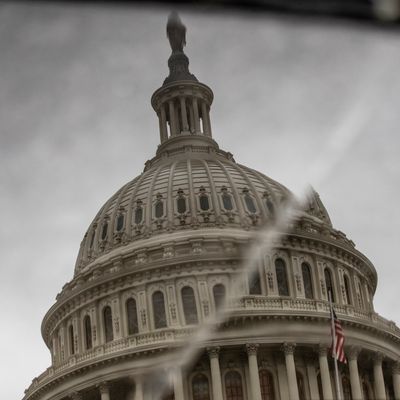
A bipartisan resolution formally condemning QAnon passed with overwhelming support in the House on Friday, though 17 Republicans voted against the measure, unwilling to reject the deranged conspiracy movement that President Trump has helped amplify and that will almost certainly find a voice in Congress come November. The 371-18 vote (with one Republican voting “present”) comes days after Democratic Representative Tom Malinowski, the lead sponsor of the resolution, was targeted with death threats by QAnon followers after a TV spot released by House Republicans’ official campaign committee falsely claimed that the Congressman, who is running for reelection, “lobbied to protect sexual predators.” Given that QAnon revolves around a secret “deep state” plot against Trump by a group of Satanic, child-molesting elites, adherents of the conspiracy movement were naturally galvanized by the debunked ad.
The resolution, which Malinowski co-authored, “condemns QAnon and rejects the conspiracy theories it promotes” as well as “all other groups and ideologies, from the far left to the far right, that contribute to the spread of unfounded conspiracy theories and that encourage Americans to destroy public and private property and attack law enforcement officers.” Along with the 17 Republicans who voted against the measure, Libertarian Representative Justin Amash, who was a Republican until 2019, also voted “no,” a decision he defended on Twitter, citing free speech concerns.
The once-fringe group has emerged from the dark corners of the internet, where it began in 2017, onto center stage in conservative politics. There will be 24 QAnon candidates on the federal ballot next month, all but two of them Republicans. Most of them don’t stand a chance at winning. But Marjorie Taylor Greene, a vocal QAnon proponent who has earned Trump’s praise, was all but guaranteed a Congressional seat in August after winning a Republican primary runoff in her deep-red Georgia district.
Despite the fact that the FBI has flagged QAnon as a potential domestic terror threat, Trump has said that he appreciates the support of its followers — who he called “people that love our country” — and has repeatedly amplified the movement’s conspiracies on social media. Tech companies like Twitter, Facebook, and TikTok have cracked down on QAnon-related groups and activity but are struggling to curb the rapid spread of misinformation put forth by the community, one that has even started to invade LinkedIn in recent months. The professional-networking site reportedly has hundreds of members with QAnon-related phrases and acronyms in their profiles or who have supported posts associated with the politically-themed conspiracy theory.






























